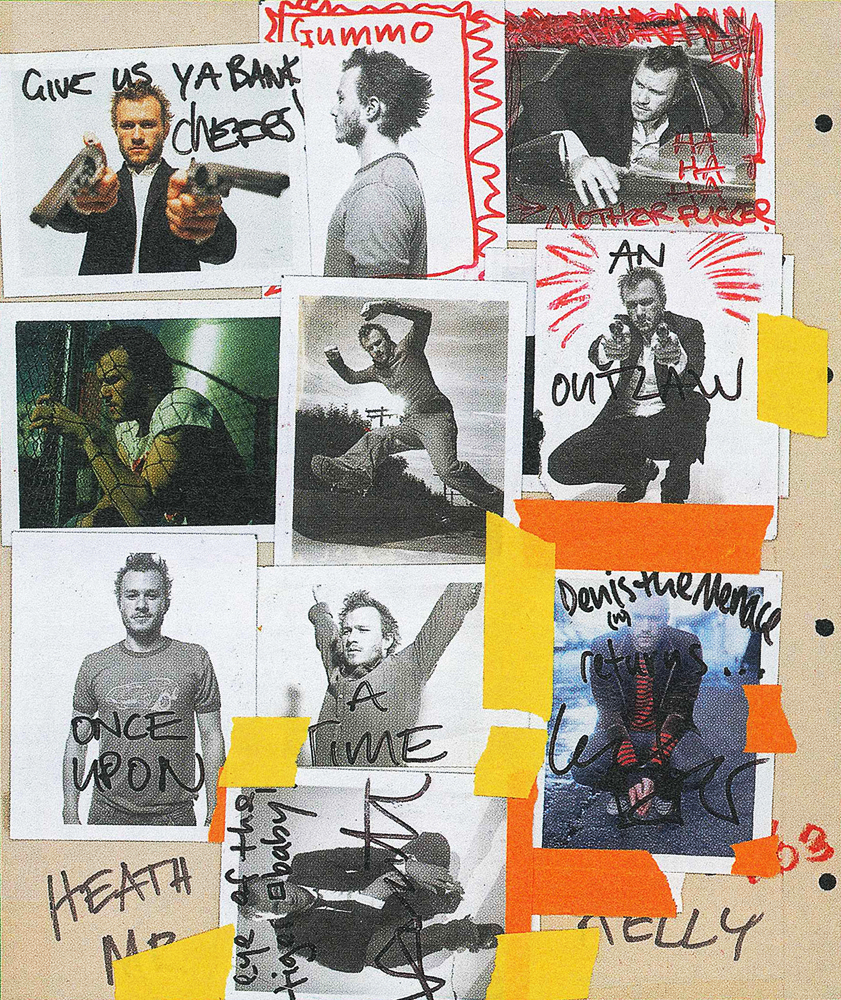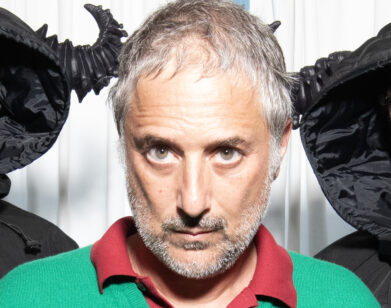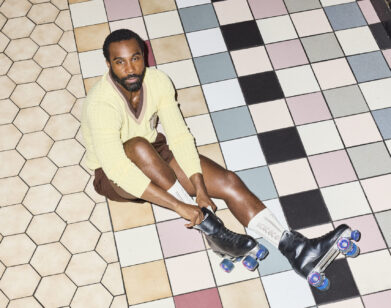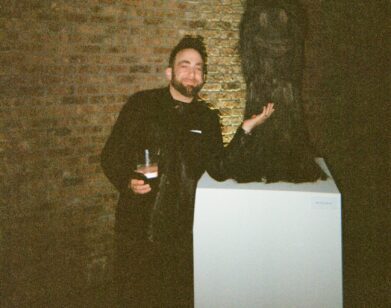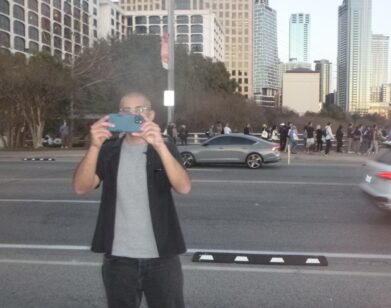Remembering Heath Ledger
A few weeks ago, I Am Heath Ledger, a new documentary centered on the Australian actor, screened at the Tribeca Film Festival in New York City. Directed by Adrian Buitenhuis and Derik Murray, the film, which will also air on Spike TV later this month, brings together collaborators, family members, and friends of the actor with the promise of forming an intimate portrait beyond the public figure. Raised in Perth, Australia, Ledger proved himself a formidable artist on-screen before his untimely death at age 28. While his abilities as a thespian were without question, lesser known were his interests in photography, directing, and music, all of which are seen in this new profile through personal footage and testaments. Today we revisit our remembrance of Ledger from April 2008, published a few months after he tragically passed away, in which those closest to him–including Michelle Williams, Naomi Watts, and Todd Haynes—shared personal memories as well as their admiration for his talent and values.
Heath Ledger: His sudden death in January made headlines, but the people closest to the actor have remained quiet. They open up for the first time about the man they knew, loved, and lost.
Steve Alexander: (Ledger’s agent at CAA) When Heath first came into my office, he was 17 years old. He had all the characteristics of a man, and yet he was a boy. But you could just feel that there was something important going on right away. Everyone who met him had that impression of him.
Amy Pascal: (co-chairperson, Sony Pictures) You always know when you meet somebody who’s going to be a movie star, because they sparkle. And as much as Heath sometimes tried to hide his sparkle, it just came through. It was that boyish, sexy, misunderstood James Dean thing that we all are always looking for. He had it.
Naomi Watts: At first, people were trying to shape him as this kind of teenage hunk. And that’s so not what he wanted. It was something that he was trying to escape into the world of real artistry. When I met him, he was just turning that corner in his work.
Steve Alexander: Things started to change around the time of A Knight’s Tale. He was the lead in the movie and there were posters of his face on every corner that said HE WILL ROCK YOU. I think he got freaked out by not being in control, and where the ride was sort of taking him, and that he wasn’t steering it. And whether it was conscious or unconscious—he said it was partly conscious—that image all got torn down again.
Naomi Watts: I think that Terry Gilliam [who directed Ledger in The Brothers Grimm and his last film, The Imaginarium of Doctor Parnassus] really unleashed that talent that was always in Heath, but which perhaps he was afraid to tap into. Terry just tapped right into Heath’s interior life, and could see that he was this deep-thinking person ad had all kinds of things in there.
Steve Alexander: Heath really went through a period of time where he wasn’t “the guy.” He was hard to get onto the proverbial list. Then he decided he was going to build his career back up the way he wanted it to be. He wanted to take parts that were more complicated and more difficult. He wanted to play characters that he could disappear into and not the leading man, which might have been an easier path for him. I think that started with Monster’s Ball, and then obviously, when he decided he would take on the part of Ennis Del Mar in Brokeback Mountain.
Todd Haynes: (director, I’m Not There) That performance in Brokeback Mountain was such a sensitive, understated, controlled interpretation of this character. The entire emotional power of that film, which is enormous, resides in that performance, and how much Heath holds in. That restraint is what makes us yield emotionally and fill in all of the pieces ourselves. So he sort of unleashes the audience’s emotions by controlling his own.
Amy Pascal: That scene in Brokeback Mountain where he stops himself from crying and he goes around the corner and sits down—I think of that scene, because it was so human and so authentic and so much about being in love.
Steve Alexander: With Brokeback Mountain, obviously, at first blush, he feared it, which is what made him go towards it. I don’t know if he understood completely the importance of what he was doing at that moment, but I think he knew that he was doing good work.
Michelle Williams: The first six weeks of our daughter Matilda’s life was this incredibly insular, protected time. it was just he and I and her, living in our new house in Brooklyn. No nanny, no help—not really even any family. A couple of friends came through, but we were really committed to forming a bond just between the three of us. And then that bubble got broken with work. Brokeback Mountain was going to come out, and the press stuff started rearing up. But those six weeks were just blissful.
Philip Seymour Hoffman: Heath and I literally met through the whole awards time [around Brokeback Mountain]. We were hanging out a lot together. I just remember that he had a childlike enthusiasm. His body was always in motion.
Todd Haynes: I saw Heath once on Conan O’Brien. He was intensely attractive and intelligent and cool, but he just made me feel like he was one of those people that I hang out with in my life. It was almost hard to watch him, because he’s not the kind of person you see on those talk shows.
Ellen DeGeneres: We’re always doing shows with people where they tell you, “Look, this person is very shy or very quiet.” I was told that Heath was like that, and really uncomfortable doing shows like mine. When he walked out the first time, I could tell that he was uncomfortable. But I thought he was very cool in a very unaffected way. Heath clearly could become anything he wanted to become—you can look at his body of work and see that he’s an incredible actor. But he didn’t try to be something that he wasn’t. And I appreciated that.
Philip Seymour Hoffman: I remember that whenever Heath talked about something he liked, he did it in the way that any fan would. He wasn’t somebody trying to cover up his excitement about something, or someone. When I think of him, I see him in a state of dance or something—this constant state of movement. It didn’t seem like anxiety to me. It seemed like excitement.
Michelle Williams: He had uncontrollable energy. He buzzed. He would jump out of bed. For as long as I’d known him, he’d had bouts with insomnia. He just had too much energy. His mind was turning, turning, turning—always turning.
Steve Alexander: He was always a rolling stone. Even at the end of his life, he lived in different houses and different places. He lived out of suitcases—just better suitcases, in better hotel rooms. He never really took root too heavily.
Ellen DeGeneres: I love buying houses and fixing them up, and Heath and Michelle lived in a house that I did. It was called a tree house, because it was centered around this amazing, huge, probably 100-year old sycamore tree. But Heath had such amazing taste—in art, in furniture. He loved that place so much. And I think he loved what I made, and then he made it better.
Naomi Watts: He was a huge, obsessive, chess freak—and very, very good at it.
Todd Haynes: Apparently he was a rugby champion and a surfing champion.
Ellen DeGeneres: He was good at anything he did. He and Michelle came over to the house once, and they were really late because he was directing a Ben Harper video. He was coming straight from that and was telling us about it and how much he loved it. And then we played poker and he proceeded to take all of our money.
Michelle Williams: He was good at sports. He was good at directing. He was good at painting. He was good at taking pictures. He was good building things. It could be infuriating to a lot of his friends—I mean, he had a talent for everything he put his mind to, pretty much, so he didn’t know limits. Maybe he had never been told that he couldn’t do something, so everything was possible for him.
Todd Haynes: He loved the idea of being around like-minded, creative people and doing work as a group. He had already put together this company, the Masses, which was kind of a troupe of people who did communal creative work, and I think he thrived in that.
Sara Cline: (partner in the Masses with Ledger and Matt Amato) Heath had come into the Masses and one of the first things he said was, “You know, there’s this girl, Grace Woodroofe, this Australian artist. She’s 17 years old and she’s got this incredible voice and I want to produce her album.” And we all kind of looked at each other and said, “Well, none of us have any experience with that.” But he said, “No, we’ll figure it out. We’ll just fly her out to Los Angeles and we’ll get it done.” And, of course, before you knew it, we had this girl literally on our doorstep with her guitar. So we did some recordings that turned out really beautifully, and Heath directed a music video for her.
Todd Haynes: He shared with me some rock videos that he’d made. They are so extraordinary. He was so gifted beyond what we’d already seen. The last one I saw that he made was to a Nick Drake song. He did it in one day in London. He went out and shot it in black and white—it’s the only video that he himself appears in. it is just a stunning piece of work. He had an instinct.
Michelle Williams: I think that music became more important to him because he could do something creative without it costing him his privacy. He could be more in the background. He could be in charge, but invisible.
Naomi Watts: I think he wanted to be someone who was doing the observing—not the one being observed. He hated not being able to go about in his life in an ordinary way. But I think that, deep down, he enjoyed that he was being recognized for his talent. I think he was starting to own that and that’s the deepest tragedy, in terms of his work. He was just beginning to own it and embrace it.
Sara Cline: He really did an amazing job of curating this very special collection of friends. He was very open with his inner circle and very private outside of that.
Steve Alexander: The people who knew him really got to know him, and then the rest got to know just what he allowed.
Naomi Watts: He had so many great friendships. He had all his Australian friends who he took everywhere with him. He had a real community.
Amy Pascal: He was always introducing you to 3,000 mates whose names you can’t remember.
Naomi Watts: I’ve never known someone so connected to their family. I became good friends with his parents and stayed in touch with them after we split. They did such an excellent job of raising a wonderful person. His parents divorced a long time ago, but each of them had new partners, and every premiere, every award ceremony, they would all come over. His sister, too. There was a real sense of wanting to share it.
Todd Haynes: When I think about where Heath was headed—I don’t know what would have happened, given his talent. But I just feel so sad about what we’re being deprived of and the work that he would have continued to bring us. He just seemed like he was on a different plane.
Philip Seymour Hoffman: Heath didn’t have the cynicism that this business can eventually put upon people, or the pretention that certain artists carry with them sometimes. He had a really honest quality about him. He obviously had never lost his wide-eyed optimism.
Naomi Watts: His acting was so touching, so connected in truth. I think he was just getting started.
Amy Pascal: I don’t think of there being a bunch of actors who fill a certain role and now there’s one less. Heath was so particular and so individual. It’s more like losing a star, a light.
Sara Cline: In his absence, I feel as though Heath has sort of slowly and quietly taken all of the people in his life that meant something to him, picked them up, and set them on this invisible road that’s only become known in his passing. We’re all kind of standing on it saying, “Well here we are.” And we have no choice but to walk forward and to do so together.
Sean Penn: Heath was not simply a quiet and gifted actor who liked to go surfing, though that is how I primarily knew him in life. In the time we spent together, we spoke a bit about family, about travels, but most of all, about film. Yet, in his unassuming way, he never revealed to me the visual poet of the first order who I discovered watching the films he directed, music videos and such, after his death. His talent does speak volumes of the kind of man, the loving father, and, in fact, the brilliant and gift guy I really missed out on—that we all did in the long run. Heath might have been a giant.
Michelle Williams: I think that the interesting thing about Heath, which maybe people have only really fully discovered in his death, is how vulnerable he was. You can pick up on it in his performances, but it’s easy to overlook because he was so physical and beautiful and strong and masculine. But there was always that underlying sensitivity. That’s who he was.
THIS FEATURE ORIGINALLY APPEARED IN THE APRIL 2008 ISSUE OF INTERVIEW.
For more from our archives, click here.

